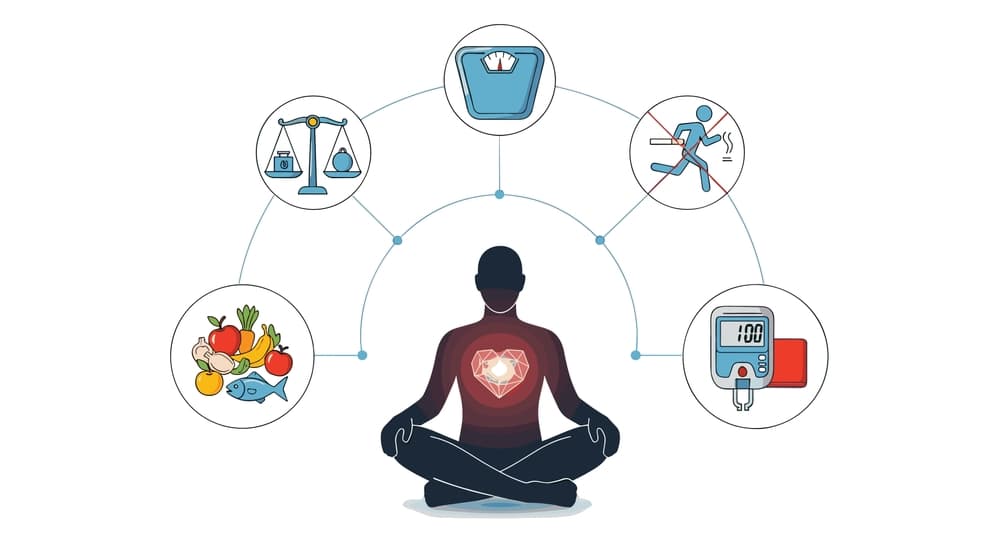The Ultimate Guide: How Mindfulness Meditation Improves Overall Health


Stress, anxiety, and mental stress have become normal in life. Mindfulness meditation improves overall health it not only provides mental relief but also increases physical well-being. Regular meditation practice calms the mind, increases focus, and helps control emotions. It helps lower blood pressure, improve sleep quality, and strengthen the immune system. A simple meditation practice helps reduce stress in daily life, stay mindful, and ensure a healthier lifestyle.
Research and personal experience have proven that Mindfulness Meditation Improves Overall Health. It not only provides mental peace but also plays a vital role in improving overall health. This regular practice enhances brain function, attention, and the ability to control emotions. Today, we will know how this simple practice can make your life healthier and happier.
Research from Harvard University has shown that
Just 10-15 minutes of mindfulness practice every day can help reduce stress, increase focus, and create a positive mindset.
What is Mindfulness Meditation and How It Improves Overall Health
Mindfulness means being awake. It means knowing what you are doing- Jon Kabat-Zinn
Mindfulness meditation is a form of mental training that helps people pay full attention to the present moment. Its central concept is:
Awareness: Being aware of what is happening around you and within you at the moment —your thoughts, feelings, physical sensations, and surroundings.
Non-judgment: Simply observing these experiences without labeling them as good or bad or reacting to them.
Present moment: Focusing the mind on the present moment, without worrying about the past or the future.
Its main goal
The goal of mindfulness meditation is not to quiet the mind or eliminate all thoughts, but to observe your thought processes from a distance and remain unaffected by them. This way, you can learn to respond to your emotions and stressful situations more healthily and calmly.
Simple example: When you do mindfulness meditation, you focus your attention on a physical sensation, such as your breathing. When your mind wanders (which is normal), gently bring it back to your breathing without judgment.
How Mindfulness Meditation Improves Overall Mental Health
Reduced stress and anxiety


Cortisol control: Meditation helps reduce levels of the stress hormone ‘cortisol’, which mitigates the physical effects of chronic stress.
Responding rather than reacting: This teaches us to calmly observe the situation rather than react automatically in moments of stress. As a result, anxious thoughts can no longer control the mind.
Learn More: Best self care habits for reducing stress and anxiety
Increased attention and memory
Improved focus: Mindfulness strengthens the brain regions (such as the prefrontal cortex) responsible for attention and concentration. This helps us stay focused on the task at hand and avoid distractions.
Working memory: Research shows that practicing mindfulness can improve working memory (the memory needed to perform immediate tasks).
Helps in coping with depression
Reduced rumination: A significant cause of depression is the repeated ruminating on negative thoughts or events (rumination). Mindfulness creates a mental detachment from such thoughts, which helps reduce the risk of depression.
Reduced relapse: Mindfulness-based cognitive therapy can significantly reduce relapse in people recovering from depression.
Mindfulness Meditation Improves Emotional Control and Stability
Emotional Awareness: This practice teaches us to notice emotions as they arise and pass, without judging them. As a result, when emotions are intense, we can be still without being carried away by them.
Empathy and Self-Compassion: Mindfulness teaches us to be kinder and more compassionate towards ourselves, which is very important for maintaining emotional stability.
Mindfulness Meditation Improves Sleep and Relaxation
Reduced Insomnia: Stress and racing thoughts are often the cause of insomnia. Meditation calms the mind and helps control anxious thoughts before bed, thereby improving sleep quality.
How Mindfulness Meditation Improves Physical Health
Protects Heart Health and Regulates Blood Pressure
Reduced Blood Pressure: Meditation reduces stress and anxiety, which are significant causes of high blood pressure. It helps relax blood vessels, thus maintaining normal blood pressure.
Heart Rate Control: Mindfulness improves heart rate variability, an essential indicator of a healthy heart.
Boosts Immune System
Reduces Inflammation: Chronic stress triggers inflammation throughout the body, which is a root cause of many diseases. Mindfulness meditation helps reduce the activity of genes that drive inflammation, thereby boosting the immune system.
Antibody Production: According to some studies, regular mindfulness practice helps the body produce antibodies in response to the influenza vaccine.
Chronic Pain Management
Changes in the Perception of Pain: Meditation does not eliminate pain, but it affects the brain regions that process pain intensity. With practice, the person becomes less reactive to pain and learns to see it as tolerable.
Mental Detachment: Mindfulness teaches that pain is just a sensation and not your entire identity. This mental detachment reduces the emotional distress caused by pain.
Improved Sleep


Coping with Insomnia: As mentioned earlier, mindfulness helps to calm the mind and stop worrying thoughts before sleep. This helps with faster, deeper sleep, which is essential for physical recovery.
Improves Digestion and Gastrointestinal Health
Mind-gut connection: Stress directly affects the digestive system. Mindfulness can help reduce stress and alleviate irritable bowel syndrome and other digestive issues.
Daily Practices: How to Apply Mindfulness Meditation to Improve Overall Health
Mindful Eating
Eating slowly: Pay full attention to the smell, taste, texture, and color of food.
Body signals: Pay attention to these body signals when you are hungry and when you are full.
Avoid distractions: Keep your phone, TV, and other activities out of reach while eating. Consciously savor the experience of each bite.
Mindful Walking


Focusing on sensations: Pay attention to the feel of your feet touching the ground, your body moving, and the air as you walk.
Purposelessness: Instead of rushing to reach your destination, treat each step as a meditation.
Mindfulness during daily tasks
Brushing teeth or washing dishes: Mindfulness can also be practiced while doing routine tasks. For example, pay attention to the temperature of the water, the smell of the soap, and the feel of the dishes while washing dishes.
Transition periods: Consciously enjoy the short breaks between completing one task and moving on to another (e.g., going up and down stairs, opening doors).
Breathing anchors
Short breaks: Whenever you feel like it during the day, stop working for 1 minute and focus only on your breath. This is the fastest way to bring your mind back to the present moment.
Using triggers: Use these triggers as an opportunity to focus on your breathing when the phone rings or before checking your email.
Mindful responses to challenging situations
S.T.O.P. Technique
Stop: Stop what you are doing for a minute.
Take a Breath: Take a few deep breaths.
Observe: Notice your thoughts and feelings.
Proceed: Respond consciously and return to work.
CoreWellFit Summary: How Mindfulness Meditation Improves Overall Health
Mindfulness Meditation is not just a mental practice; it is a comprehensive approach to improving overall health and quality of life. Scientific studies have unequivocally proven that Mindfulness Meditation Improves Overall Health. It reduces stress hormones, brings mental stability, increases focus, and improves heart health.
Mindfulness teaches us to respond consciously to life’s stressful situations or negative thoughts, rather than running away from them. This practice helps us to be calmer, compassionate, and steadier in our daily lives.
Practicing mindfulness is no longer a luxury but an essential skill for achieving long-term well-being and living a fulfilling life. Start today, because inner peace is your best health.









